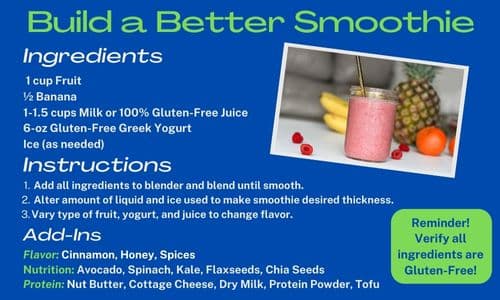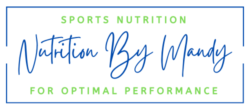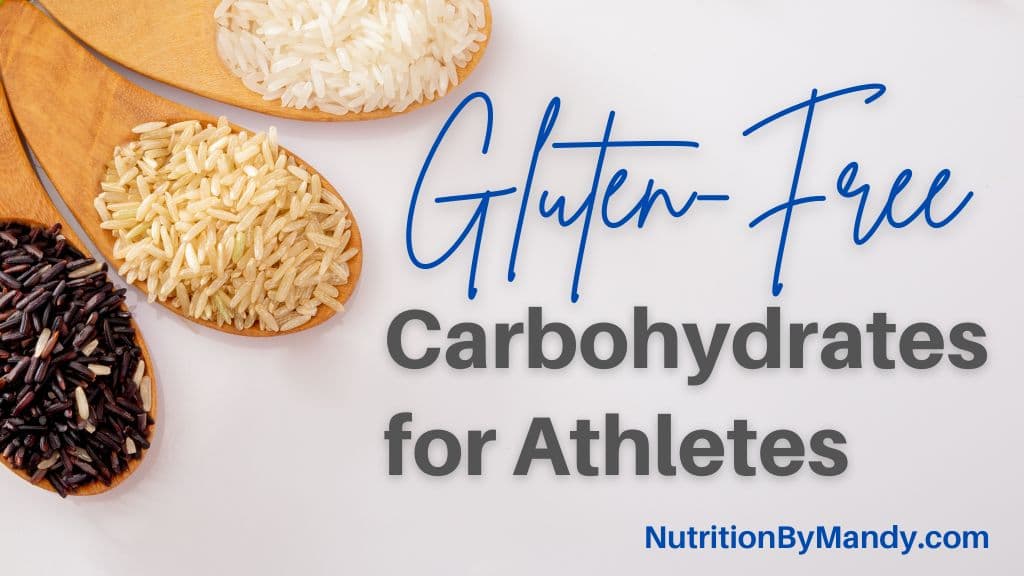Best Gluten-Free Carbohydrates for Athletes
If you are an athlete with Celiac Disease, a sensitivity to gluten, or a wheat allergy, choosing gluten-free carbohydrates is important. Carbohydrates provide athletes with the energy needed to perform at their best during training and competition.
Here are ideas for gluten-free carbohydrates that athletes can eat to help them fuel their workouts and support optimal performance.
What is Gluten?
Gluten is a naturally occurring storage protein found in wheat, barley, rye, as and hybrids of these grains. It helps provide texture, structure, and elasticity to food products (1).
Given its unique characteristics, processed foods may have added gluten to help the product maintain form and enhance texture (1).

Gluten-Free Carbohydrate Options
There are numerous ways athletes following a gluten-free diet can meet their carbohydrate needs.
Although it is common to think of wheat bread, pasta, and grains when one hears the word “carbohydrate,” in actuality carbohydrates come from a variety of food groups. In addition to grains, athletes can get carbohydrates in their diet from fruit, starchy vegetables, beans, legumes, milk, and yogurt
When planning meals and snacks, athletes should focus on including a variety of items from each of the food groups to support their performance nutrition needs.
Fruit – Naturally a Gluten-Free Carbohydrate
Fruit is an excellent gluten-free carbohydrate choice for athletes. It contains the sugar fructose and is naturally gluten-free. In addition to carbohydrates, fruit provides athletes with fiber, vitamins, minerals, phytochemicals, and antioxidants.
A small, 4-oz piece of fresh fruit provides the body with ~15 grams of carbohydrates (similar carbohydrate content as 1 slice of bread). In general, most athletes consume a larger serving size than a 4-oz piece of fruit. For example, a large banana contains ~30 grams of carbohydrates.
Adding a piece of fruit to to breakfast or a pre-game snack can be a great way for athletes to add carbohydrates to their day.
Gluten-Free, High Carb Fruit Smoothie
A fruit smoothie can be a great high-carbohydrate, gluten-free item for athletes to add to their diet. A fruit smoothie can be a great breakfast on-the-go, post-workout shake, or afternoon snack.
Athletes can add a variety of frozen fruits and banana slices to make a high-carbohydrate smoothie that will help keep their body fueled all day long.

Dried Fruit
Dried fruit is another easy way for athletes to boost their carbohydrate intake. A quarter-cup serving of dried fruit provides~15 grams of carbohydrates.
In addition to carbohydrates, dried fruit contains fiber, phytochemicals, vitamins, and minerals (2). Dried fruit, such as raisins, cranberries, pineapple, and mango, makes a nutritious addition to salads, gluten-free breakfast cereals, and trail mix.
When purchasing dried, canned, or frozen fruit, it is important for athletes to review the ingredient labels and packaging carefully. Athletes need to ensure that no gluten-containing sweeteners or additives were used in the product.
Starchy Vegetables, Beans, and Legumes
Similar to fruit, fresh vegetables are naturally gluten-free. Starchy vegetables are a great way to add carbohydrates, fiber, vitamins, and minerals to an athlete’s diet.
In general, a ½ cup serving of starchy vegetables provides ~15 grams of carbohydrates. Athletes should onsider making the starchy vegetables below a routine part of their performance diet.
- Potatoes and sweet potatoes
- Beans, peas, and legumes: Check the ingredient label and package on canned beans and legumes to ensure no gluten-containing ingredients are added.
- Winter squash varieties: Butternut, Acorn, Pumpkin
- Corn: Whole kernel corn is naturally gluten-free. In addition, gluten-free products commonly use corn flour as an ingredient in place of wheat. Double-check the ingredient label on items such as corn tortillas and cornbread to ensure wheat flour was not added to the product. Many processed items contain a mixture of grains, so make sure to verify that the item purchased is truly gluten-free.
Review the ingredient labels and packaging on all canned and frozen vegetables to ensure no ingredients, seasonings, or sauces were added that contain gluten.
Gluten-Free Grains
Athletes on gluten-free diets may be wondering what type of grain items are safe to eat. Below are grains that are gluten-free in their natural form.
Athletes should be aware that many times wheat, barley, and rye are grown and harvested alongside the grains listed below. Cross-contamination with gluten is a possibility during this process. For this reason, purchasing items that are labeled and certified as gluten-free is recommended.
Rice – Plain, natural rice is an excellent gluten-free grain choice for athletes. Athletes on a gluten-free diet can enjoy a wide variety of types of rice, including: brown rice, white rice, Asian “sticky” rice, and wild rice.
Athletes should use caution with packaged rice mixes. The mix may have ingredients containing gluten added to enhance the flavor or texture. It is important to readthe ingredient label and package carefully to ensure the product being purchasing is gluten-free.
Oats – Although oats are gluten-free grains, oats are considered high-risk for cross-contamination with wheat, barley, and rye during harvest and processing.
The Celiac Disease Foundation recommends individuals on a gluten-free diet only purchase oat products specifically labeled as being gluten-free. In addition, oats contain other substances that may cause a reaction or result in discomfort (3). Thus, it is recommended that athletes following a gluten-free diet visit with their doctor and/or dietitian prior to adding oats to their meal plan.
Similar to rice mixes, athletes should use caution with packaged oatmeal and hot breakfast cereals. These items may contain ingredients with gluten so read the labels carefully.
If athletes enjoy oatmeal or granola for breakfast, Bob’s Red Mill®, Purely Elizabeth®, and Bakery on Main® have a variety of gluten-free options available.
Quinoa – Quinoa is a type of seed; thus, it is an excellent gluten-free carbohydrate option. A 1-cup serving of cooked quinoa contains ~40 grams of carbohydrates (4).
Quinoa is also a complete protein, containing all 9 essential amino acids. Athletes looking for a gluten-free option to boost the nutritional quality of their meals should try adding in quinoa.
Due to the risk of cross-contamination with other grains, athletes should purchase quinoa products that are certified or labeled gluten-free.
Pasta – Athletes following gluten-free diets need to avoid traditional pastas made with wheat flour. However, there are numerous other varieties of gluten-free pastas that athletes can enjoy.
Athletes can consider trying rice noodles, pastas made with legumes or chickpeas, or gluten-free noodles made with rice, corn, or quinoa.
Breakfast Cereal – Gluten-free breakfast cereals made with corn or rice can be a great way for athletes to add carbohydrates to their breakfast. Athletes should make sure to read the ingredient label and package carefully to ensure no added ingredients contain gluten. Nature’s Path®, Barbara’s®, and ChexTM all have a variety of gluten-free cereals available.
For a quick and healthy snack idea, athletes can try making their own trail mix. Athletes can simply mix together their favorite gluten-free breakfast cereals, a variety of nuts, and dried fruit. The mix can then be packed into individual size serving bags for a nutritious snack on-the-go.

Milk
When considering ways to add gluten-free carbohydrates to an athlete’s meal plan, don’t forget about milk. A 1-cup serving plain, cow’s milk contains 12 grams of carbohydrates along with protein, calcium, and Vitamin D (5).
Athletes can enjoy drinking milk with their meals, add it to their post-workout smoothies, or have milk with their cereal to help boost their daily carbohydrate intake.
Although plain, cow’s milk is gluten-free, be aware that not all flavored milks and dairy products are. Athletes need to review the ingredient label and packaging on all milk and dairy products to ensure no added ingredients contain gluten.
Yogurt
Similar to milk, yogurt also contains carbohydrates. A 6-oz serving of plain, fat-free regular yogurt contains ~12 grams of carbohydrates (6). Greek yogurt tends to be lower in carbohydrates than regular yogurt, containing ~8 grams of carbohydrates per 7-oz (7).
Although lower in carbohydrates, Greek yogurt typically has approximately twice as much protein as regular yogurt. Topping Greek yogurt with fresh fruit and gluten-free cereal can make for an excellent high-carbohydrate, high-protein snack.
Keep in mind, many yogurts are sweetened with fruit, honey, and other added ingredients. Athletes should use caution as the added ingredients may contain gluten. Athletes need to read ingredient labels and packages carefully to ensure the yogurts they are purchasing are gluten-free.
Fuel Your Workouts with Gluten-Free Carbohydrates
You now have an idea of the many gluten-free carbohydrate options that athletes can use to fuel their workouts and every day activities.
Choosing carbohydrates that are low in fiber before and during activity is recommended. In addition, athletes should practice their gluten-free pre-workout fueling strategy prior to competition to determine what foods and beverages work best for them.

Gluten-Free Carbohydrates for Athletes
As an athlete on a gluten-free diet, you can move forward with confidence knowing there are many ways that you can meet your carbohydrate needs. Remember when shopping to be diligent with reading ingredient labels and food packages to verify items are gluten-free. Also, take time to plan ahead to ensure you have gluten-free snacks available to help you train and perform at your best.
For a customized gluten-free meal plan, consider meeting with a sports dietitian nutritionist. The sports dietitian nutritionist can assist you with developing a performance meal plan specific to your individual needs.
For further information on Celiac Disease and gluten-free diets, visit the Celiac Disease Foundation® website.
Join the Nutrition By Mandy Email List & Get a Free Weekly Meal Planner Template
Click HERE to join the Nutrition By Mandy e-mail list. When you join you will receive a free weekly meal planner template to download and plan out your meals for the week.
About the Author
Mandy is a Sports Dietitian Nutritionist in the San Antonio, TX area. She is a Registered and Licensed Dietitian, a Board-Certified Specialist in Sports Dietetics, a Licensed Athletic Trainer, and is a Certified Exercise Physiologist through the American College of Sports Medicine. Mandy has experience working with athletes at the high school, collegiate, and professional levels. She believes the key to reaching one’s full potential, both in everyday life and in sports performance, relies on a healthy nutritional foundation. Learn more about the work Mandy does here.


Pingback: 11 Healthy College Dorm Foods for Athletes -
Pingback: Best Golf Snacks for Energy on the Course - Nutrition By Mandy
Pingback: Gluten-Free Pre-Workout Meals and Snacks for Athletes - Nutrition By Mandy